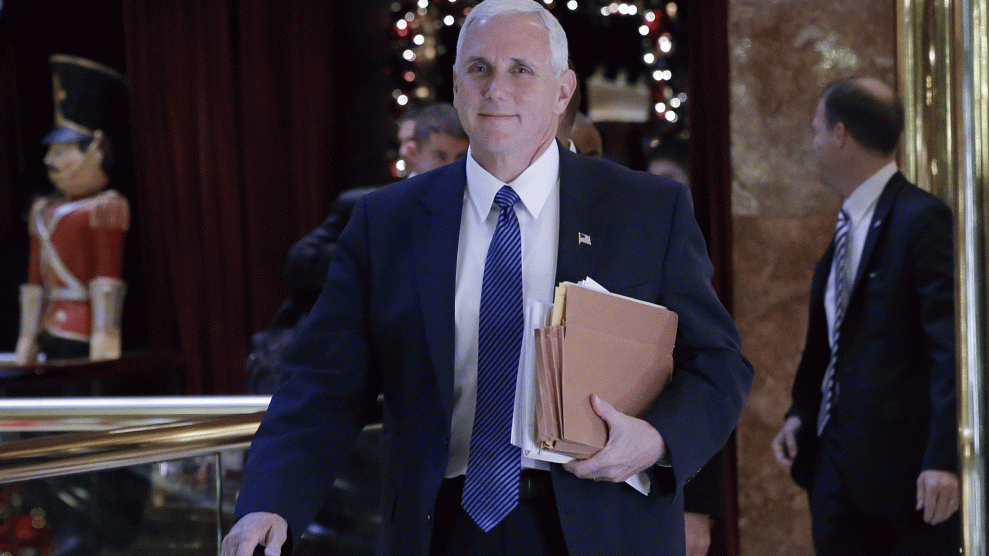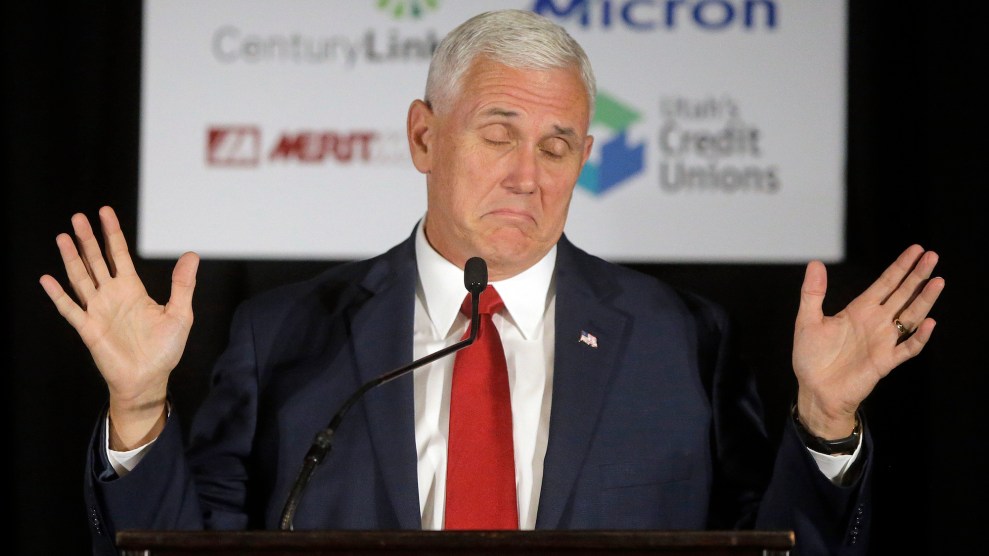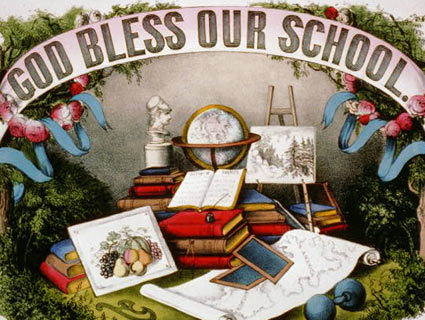
Vice-President elect Mike PenceJohn Angelillo/CNP via ZUMA Wire
One of Vice President-elect Mike Pence’s pet projects as governor of Indiana was expanding school choice vouchers, which allow public money to pay for private school tuition. President-elect Donald Trump has said he’d like to expand such vouchers in the rest of the country, but what happened in Indiana should serve as a cautionary tale for Trump and his administration.
Pence’s voucher program ballooned into a $135 million annual bonanza almost exclusively benefiting private religious schools—ranging from those teaching the Koran to Christian schools teaching creationism and the Bible as literal truth—at the expense of regular and usually better-performing public schools. Indeed, one of the schools was a madrasa, an Islamic religious school, briefly attended by a young man arrested this summer for trying to join ISIS—just the kind of place Trump’s coalition would find abhorrent.
In Indiana, Pence created one of the largest publicly funded voucher programs in the country. Initially launched in 2011 under Republican Gov. Mitch Daniels, it was sold as a way to give poor, minority children trapped in bad public schools a way out. “Social justice has come to Indiana education,” Daniels declared after the voucher legislation passed. It was supposed to be a small program, initially capped at 7,500 vouchers. Full vouchers, worth 90 percent of the per-pupil spending in a school district, were reserved for families with incomes up to 100 percent of the cutoff for free or reduced-price school lunch, about $45,000 a year for a family of four.
But in 2013, Pence and the state’s GOP-controlled Legislature raised the income limits on the program so that a family of four with up to $90,000 in annual income became eligible for vouchers covering half their private school tuition. They also removed most requirements that students come from a public school to access the vouchers, making families already attending private school eligible for tuition subsidies, thus removing any pretense that the vouchers were a tool to help poor children escape failing schools.
By the 2015-16 school year, the number of students using state-funded vouchers had shot up to more than 32,000 in 316 private schools. But Pence’s school choice experiment demonstrates that vouchers can create a host of thorny political problems and potential church-and-state issues. Almost every single one of these voucher schools is religious. The state Department of Education can’t tell parents which or even whether any of the voucher schools are secular. (A state spokeswoman told me Indiana doesn’t collect data on the school’s religious affiliation.) Out of the list of more than 300 schools, I could find only four that weren’t overtly religious and, of those, one was solely for students with Asperger’s syndrome and other autism spectrum disorders, and the other is an alternative school for at-risk students.
Opponents, including public school teachers and local clergy, sued the state to try to block the voucher program in 2011, arguing that it clearly violated the state constitutional provisions that protect taxpayers from having to support religion. They were also concerned that the money going to the religious schools was coming directly from local public school systems, draining them of critical funding in violation of the state constitution. But the Indiana state Supreme Court ruled in 2013 that the voucher program was constitutional because public money was going to the students and not to religious institutions directly.
But religious institutions benefited almost immediately from the program. Vouchers effectively served as a public bailout for the state’s Catholic schools. As is the case in other parts of the country, many of Indiana’s Catholic schools, financially troubled and facing declining enrollment, were on the verge of closing before the voucher program launched in 2011. By the 2013-2014 school year, more than 50 percent of the school choice vouchers were going to shore up Catholic schools.
And despite what the Indiana Supreme Court said about the money not going directly to the churches, an Indiana priest made headlines in 2014 when he urged parishioners at St. Jude in Fort Wayne to apply for vouchers for their kids in the church school to help “ease the financial burden on the parish.” Father Jake Runyon noted that with help from the vouchers, the church would finally be able to fix the steeple on the building and get a new sound system. The pitch seemed to have worked: The number of kids at St. Jude receiving vouchers jumped from 86 in 2012 to 304 in 2015.
Indiana’s choice law prohibits the state from regulating the curriculum of schools getting vouchers, so millions of dollars of the state education budget are subsidizing schools whose curricula teaches creationism and the stories and parables in the Bible as literal truth. Among the more popular textbooks are some from Bob Jones University that are known for teaching that humans and dinosaurs existed on the Earth at the same time and that dragons were real. BJU textbooks have also promoted a positive view of the KKK, writing in one book, “the Klan in some areas of the country tried to be a means of reform, fighting the decline in morality and using the symbol of the cross to target bootleggers, wife beaters and immoral movies.”
Other Indiana Christian voucher schools use the A Beka program, whose history books are known for whitewashing slavery. An A Beka passage on slavery notes, “A few slave holders were undeniably cruel. Examples of slaves beaten to death were not common, neither were they unknown. The majority of slave holders treated their slaves well.” (For a comprehensive look at both curricula, see here.)
The Indiana Christian Academy uses curricula from both Bob Jones and A Beka while Kingsway Christian School in Avon, Indiana, spends some of its taxpayer money to take kids on field trips to the Creation Museum in Kentucky, where they can learn how dinosaur bones prove the truth of Noah’s Ark and the Great Flood. Teaching creationism as fact in public or charter schools is illegal because of First Amendment prohibitions on the government advocating religion, but there’s nothing stopping schools funded with public vouchers from doing it.
Perhaps not surprisingly, the kids in these schools aren’t performing very well on the state’s standardized tests, putting voucher schools among the state’s worst-performing schools. The three campuses of Horizon Christian Academy rank near the bottom. Two of its schools were once for-profit charter schools that lost their charters because they were badly underperforming. They reconstituted as private religious schools and now take taxpayer-funded vouchers. In 2015, less than 9 percent of the students at one of the Horizon campuses passed the state standardized tests in math and English, a rate worse than most of the state’s public schools from which the vouchers were supposed to provide an escape.
A study by researchers at Notre Dame University published last year shows that in the first three years of the program, Indiana kids who left public schools to attend voucher schools saw their math scores decline in comparison with their peers who remained in regular public schools. The public school students saw improvements in their English skills, but the voucher kids’ results stayed flat. The voucher schools can’t necessarily blame low test scores on poverty, either. According to data from the state, today more than 60 percent of the voucher students in Indiana are white, and more than half of them have never even attended any public school, much less a failing one. Some of the fastest growth in voucher use has occurred in some of the state’s most affluent suburbs. The Center for Tax and Budget Accountability, a Chicago-based think tank, recently concluded that because white children’s participation in the voucher program dwarfed the next largest racial group by 44 points, the vouchers were effectively helping to resegregate public schools.
Yet Pence and Trump himself have made it clear they intend to push Indiana’s voucher program on the rest of the country, and the president-elect has said he wants to push states to devote another $110 billion to funding vouchers. Trump’s choice of education secretary, Amway billionaire Betsy DeVos, has been a prominent promoter of Pence’s voucher program as well. Her family has poured millions of dollars into a political action committee that promoted vouchers in Indiana and other states and also backed pro-voucher politicians in Indiana, including Pence himself and the state school superintendents.
But all these fans of religious vouchers may find one detail in Indiana’s history disturbing, especially given their outspoken condemnation of Muslims. Pence has made clear he believes the United States is “in a war against radical Islam.” Last year, as governor, he tried to ban Syrian refugees from resettling in Indiana following the Paris terrorist attacks in 2015. And Trump proposed banning all Muslims from entering the United States. Yet Pence’s favorite education reform ensured that Indiana tax dollars paid for students to attend schools like the MTI School of Knowledge in Indianapolis.
MTI stands for Madrasa Tul-Ilm. It’s an Islamic school, where 90 percent of its 225 students receive state voucher funding for their tuition, according to the school, to the tune of more than $1 million a year, making it one of the largest recipients of state voucher money. Thanks to the vouchers, the number of students attending MTI is now triple what it was in 2011.
In 2013, a young Muslim man named Akram I. Musleh attended the school for about eight weeks, as he bounced around several schools on his way to becoming radicalized. In September, he was indicted for providing material support to terrorists after allegedly trying to join ISIS. The school wouldn’t confirm whether Musleh himself was the beneficiary of a state-funded tuition voucher.


















